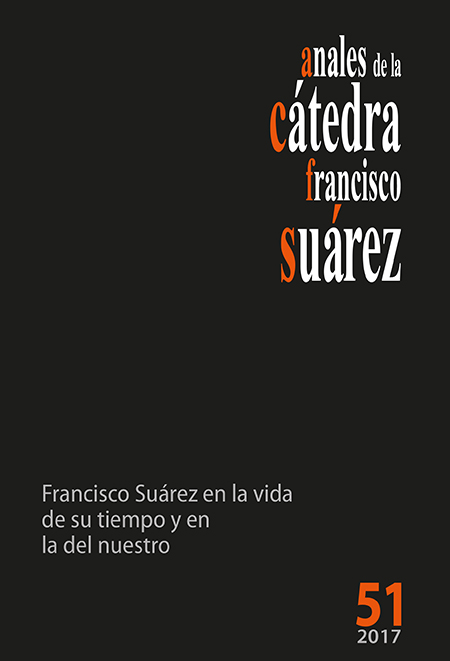El problema de la felicidad en Aristóteles: respuestas desde Francisco Suárez y Martha Nussbaum
DOI:
https://doi.org/10.30827/acfs.v51i0.6245Palabras clave:
Felicidad, Eudaimonía, Aristóteles, Suárez, Nussbaum, individualismoResumen
La idea de felicidad en Aristóteles está mediada por el sentido teleológico que otorga a la vida humana. La vida está orientada de un modo intrínseco e inherente hacia la eudaimonía, hacia la vida buena. Este es, grosso modo, el fundamento de la ética aristotélica. En este trabajo se pretenden confrontar las respuestas, en tanto que interpretaciones, de la idea de felicidad que han obtenido dos autores que apoyan sus respectivas teorías éticas en los planteamientos aristotélicos de felicidad. Sin embargo, las respuestas son bien distintas, y dependen de los presupuestos metafísicos de ambos autores. Mientras Francisco Suárez (1548-1617) desde la comprensión del ser humano como un ser en relación, la idea de vida buena le lleva a desarrollar lo que algunos han denominado un “antropocentrismo crítico” de clara inspiración ignaciana, en la que nunca pierde de vista el valor de lo social como fuente primera para la caracterización de lo humano ni el sentido trascendente del fin último de la vida humana; Martha Nussbaum (1947) se servirá de una interpretación ilustrada, que inspirará el pensamiento liberal posterior, para justificar la radical diferenciación del yo como paso ineludible para el reconocimiento de aquello que nos hace humanos, aquello que denomina “capacidades centrales”. Los cuatrocientos años que median entre ambas propuestas nos parecen más que una medida de inconmensurabilidad, una oportunidad para sustentar la crítica denominada “individualismo metodológico”, una de las más controvertidas que ha recibido el denominado Enfoque de las Capacidades Humanas, desarrollado entre otros por la propia Nussbaum junto a Amartya Sen a partir de los años 1980.
Descargas
Citas
Aristóteles (1995) . Ética nicomaquea. Ética eudemia. Traducción y notas de Julio
Pallí Bonet . Madrid: Editorial Gredos .
Aristóteles (2011) . Poética . Magna moralia . Traducción de Leonardo Martínez Du- pla . Madrid: Editorial Gredos .
Aubenque, P . (2015) . Suárez y el advenimiento del concepto de ente . Logos. Anales del Seminario de Metafísica, 48, 11-20 .
Bergadá, M . M . (1949) . El aporte de Francisco Suárez a la filosofía moderna . Actas del Primer Congreso Nacional de Filosofía, 3, 1921-1926 .
Bueno, G . (2005) . El mito de la felicidad . Barcelona: Ediciones B .
Burlando, G . (2016) . Bien trascendental: salvación y comunidad fuerte en F . Suárez . Teología y vida, 57(3), 309-333 .
Castellote, S. (1978). Introducción. En Commentaria una cum quastionibus in libros Aristotelis De anima (Introducción y edición crítica Salvador Castellote, Vol. I). Madrid: Sociedad de Estudios y Publicaciones.
Cooper, J .M . (1975) . Reason and Human Good in Aristotle. Cambridge, MA: Cambridge University Press .
Courtine, J.-F. (1989). Différence ontologique et analogie de l´être. Le tournant suarézien. Bulletin de la Societé française de Philosophie, 83(2), 41-67 .
Courtine, J .-F . (1990) . Suarez et le système de la métaphysique. París: Presses Uni- versitaires de France - PUF .
Elorduy, E . (1970) . Datos para el proceso de beatificación del P . Francisco Suárez, S.I. Archivo Teológico Granadino (33) .
Elorduy, E . (1980) . Suárez en la historia de la moral . Cuadernos salmantinos de filosofía, VII, 133-147 .
Lledó, E . (2011) . El epicureísmo . Madrid: Taurus .
Lledó, E. (1995). Introducción a las éticas. En Ética nicomáquea. Ética eudemia (Julio Pallí Bonet, pp . 7-125) . Madrid: Gredos .
Lozano Delmar, J ., Sánchez-Martín, M . & Muñiz Velázquez, J .A . (2016) . To be a Fan is to be Happier: Using the Eudaimonic Spectator Questionnaire to Measure Eudaimonic Motivations in Spanish Fans . Journal of Happiness Studies, 1-20 .
Nussbaum, M. C. (1972). Psyche in Heraclitus, II. Phronesis (17), 153-170 .
Nussbaum, M . C . (2004) . La fragilidad del bien. Fortuna y ética en la tragedia y la filosofía griega. Madrid: La balsa de la medusa .
Nussbaum, M . C . (2005) . El cultivo de la humanidad. Una defensa clásica de la reforma en la educación liberal. Barcelona: Paidós Básica .
Nussbaum, M . C . (2006) . El conocimiento del amor: ensayos sobre filosofía y literatura. Madrid: Antonio Machado Libros .
Nussbaum, M . C . (2008) . Paisajes del pensamiento. La inteligencia de las emociones. Barcelona: Paidós .
Nussbaum, M . C . (2013) . Political emotions. Why love matters for justice. Cambridge, MA: The Belknap Press of Harvard University Press .
Descargas
Publicado
Cómo citar
Número
Sección
Licencia
Los nombres y direcciones de correo-e introducidos en esta revista se usarán exclusivamente para los fines declarados por esta revista y no estarán disponibles para ningún otro propósito u otra persona.
Los autores y autoras poseen los derechos sobre sus trabajos. Los ACFS ruegan que se haga constar la publicación en los mismos si aparecieran con posterioridad en otro medio.

















